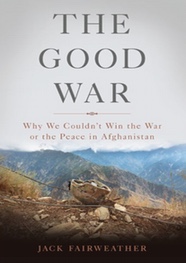Review of Jack Fairweather’s “The Good War: Why We Couldn’t Win the War or the Peace in Afghanistan”
 The American war in Afghanistan goes on and on and on.
General Martin Dempsey, who chairs the Joint Chiefs of Staff, was
quite honest when he said that to get rid of ISIS, our latest enemy
in the never-ending War on Terror, 80,000 US troops will be needed.
The American war in Afghanistan goes on and on and on.
General Martin Dempsey, who chairs the Joint Chiefs of Staff, was
quite honest when he said that to get rid of ISIS, our latest enemy
in the never-ending War on Terror, 80,000 US troops will be needed.
While few in Washington will publicly admit that we are in a trap from which we cannot easily extricate ourselves, unable to withdraw or “win” in so complex, varied and perplexing region, there’s something about the place that has attracted would-be conquerors’ passion to control and change so poor, largely illiterate, intensely religious and tribal poppy-growing country as Afghanistan.
Many veteran journalists have been on the scene and written about their experiences. Among the latest and best are the Wall Street Journal’s Anand Gopal’s new, fresh, and biting No Good Men Among the Living: America, the Taliban, and the War Through Afghan Eyes, in which he reveals over and again the failures of America’s military intervention, perhaps even worse than even cynics back home believed. General (ret.) Daniel Bolger’s Why We Lost: A General’s Inside Account of the Iraq and Afghanistan Wars, places much of the blame on US Generals – A bit too much, since he omitted politicians, lobbies and our bellicose home front warriors. Still, his NY Times Op Ed put it best when he defined insanity and US military policies in Afghanistan “as doing the same thing over and over and expecting different results. I think we’re there.”
Other worthy books detail how our two wars have badly damaged, even broken so many of our troops. Among the more haunting are Anne Jones’ They Were Soldiers: How the Wounded Returned from America’s Wars, the Untold Story and Yochi Dreazon’s new book The Invisible Front: Love and Loss in an Era of Endless War.
The most recent work, The Good War: Why We Couldn’t Win the War or the Peace in Afghanistan, is by Jack Fairweather, a veteran foreign correspondent for Britain’s Daily Telegraph and now Bloomberg News. Among its many virtues is that it is more or less a complete account of the war and an argument for what can and cannot be accomplished. His primary lesson: there are real limits to what US military power can achieve.
His description of a younger generation of radical jihadists is told through the story of Mohammed Qari Ramazan, an Afghan boy from a remote, impoverished village with no electricity or running water “six hours’ journey” from Kabul by often impassable roads. His parents, though, thought well enough of their son to send him to Peshawar to be educated at a privately-run madrassa managed by the Haqqani network. There he studied the Quran but also learned how to make bombs, operate an AK-47, and eventually became a suicide bomber, attacking and killing guests at a Norwegian embassy reception in Kabul. It was a harbinger of things to come.
Fairweather also describes yet another, unfamiliar, side of the invasion. For some expatriates the war and occupation was a ball with lots of money to be made, sex where they could find it, and splendid drinking companions. He quotes the Guardian’s well-known reporter Simon Jenkins who compared Kabul to “Klondike before the gold rush,” with the ex-pats “driving up rents, cruising around in armored jeeps and spending stupefying sums of other people’s money, essentially on themselves.” The British Ambassador Cowper-Coles was so appalled he warned, “In an environment like Kabul, drinking could be a problem…. Too many Embassy staff spent too many evenings drinking late in the bar.” The Taliban, meanwhile, loathed the unwelcome nightlife as “corrupting the country’s morals” and compared Kabul’s unwelcome, well-heeled foreign elite with the exhausting poverty of most Afghans.
With hope, Afghanistan (and Iraq) has taught some policymakers and a few neoconservative ideologues a good lesson. Former defense secretary Robert Gates wisely echoed Colin Powell when he sensibly and prudently wrote, “in my opinion, any future defense secretary who advises the president to send a big American land army into Asia or into the Middle East or Africa should 'have his head examined.' ” Still, new and expensive wars are now underway in Iraq and Syria, while the American people are silent.
It’s not that Fairweather is opposed to helping struggling and insolvent nations in trouble—though he rarely bothers to clarify or expand on this—but his gripping and convincing book challenges the delusion that military force can transform a society that may not want to be transformed.
As Robert McNamara wrote when he finally came to his senses after Vietnam: “We viewed the people and leaders of South Vietnam in terms of our own experience. We do not have the God-given right to shape every nation in our own image or as we choose.” The damage caused by this huge mistake, correctly concludes Fairweather, “has been great. Yet even now it’s not too late to chart a different course.”
